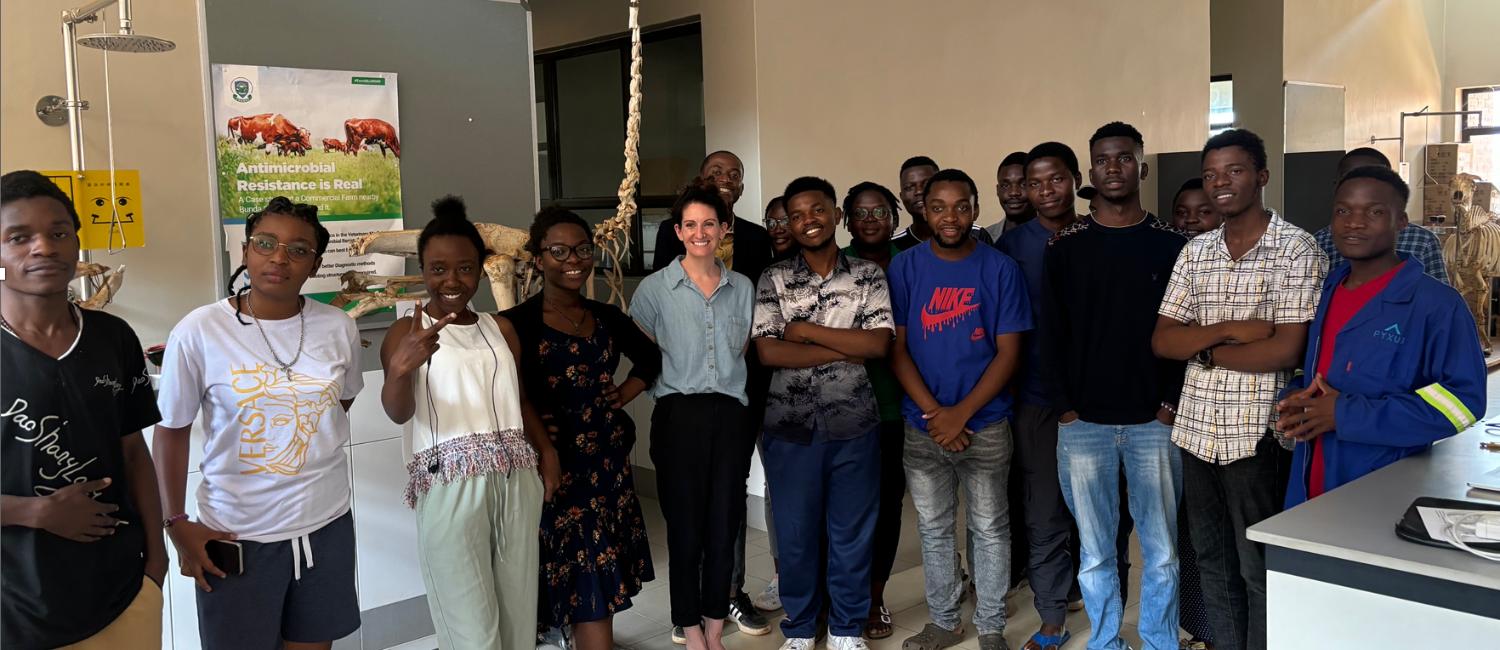Penn Vet Student Spends Semester in Malawi as Part of New Educational Partnership

As a student in the University of Pennsylvania School of Veterinary Medicine’s (Penn Vet) VMD-PhD program, Ashley Vanderbeck’s educational path has been a long one.
Over the course of eight years, she had completed a PhD in Immunology and is currently finishing the curriculum required to earn her VMD. With a wide range of classroom and lab electives already completed — and small and large animal clinical training opportunities selected — Vanderbeck faced a crucial decision in the fall of 2023: what final elective to choose.
Enter Associate Dean of One Health Jennifer Punt, VMD, PhD. Leveraging an extensive collaboration network stemming back to her time at Haverford College, Punt was tasked with developing an initiative to integrate Penn Vet’s immunology expertise with the emerging curriculum of Faculty of Veterinary Medicine at Lilongwe University of Agriculture and Natural Resources (LUANAR) in Malawi. And when Punt and Vanderbeck met over coffee to discuss potential independent study projects, Punt saw an opportunity to turn the emerging initiative into a reality. With the endorsement of Associate Dean of Education Kathryn Michel, DVM, what started as a creative solution to elective uncertainty quickly evolved into a new institutional partnership.
Facilitated by a Memorandum of Understanding (MOU) and supported by funding from Gilbert S. Kahn Dean of Veterinary Medicine Andrew M. Hoffman, DVM, DVSc, DACVIM, a novel program between Penn Vet and LUANAR was formed to foster educational exchange and research opportunities. The collaboration officially launched in January 2024 with Vanderbeck offering online immunology instruction to LUANAR veterinary students, and Punt and other Penn Vet representatives contributing recorded lectures. In March 2024, the partnership was elevated by Vanderbeck traveling to Malawi, East Africa, to teach and collaborate in-person.
“Veterinary medicine knows no borders, and collaboration is essential for addressing the global challenges we face,” Punt said. “By partnering with institutions like LUANAR, we have a unique opportunity to gain invaluable perspectives on wildlife and livestock interactions, as well as a broader understanding of diseases that transcend geographic boundaries. This partnership isn’t just about education; it’s about becoming part of a global community to tackle the animal health issues that affect us all.”
Over the course of three months, Vanderbeck curated and taught an immunology course to 22 third-year LUANAR veterinary students, drawing on the expertise of faculty from both institutions – including Penn Vet Associate Professor of Biomedical Sciences Michael May, PhD. Beyond delivering lectures in the classroom, Vanderbeck focused on providing hands-on immunology experiences through lab work and community engagement.
On some days, Vanderbeck demonstrated how to utilize SNAP tests, which detect antibodies and antigens of pathogens. On other days, Vanderbeck took the students to farms to practice administering cattle vaccines, or to visit the Lilongwe Society for the Protection and Care of Animals (LSPCA) to develop canine interaction skills.
“This experience was the type of equitable knowledge exchange I had always hoped to experience as part of my education at Penn Vet,” Vanderbeck said. “I love talking about immunology, teaching, and mentoring, and this program fundamentally changed the way I think about all those things. I am eternally grateful for Penn Vet’s support in pursuing this collaborative, impactful type of learning.”

Research Across Borders
The spring rollout of the partnership between Penn Vet and LUANAR also included research collaboration, spearheaded by Assistant Professor of Clinical Microbiology Stephen Cole, VMD, MS, DACVM, Assistant Professor of Clinical Parasitology Caroline Sobotyk de Oliviera, DVM, PhD, and LUANAR lecturer in clinical medicine Catherine Wood, DVM. By combining expertise in infectious disease and epidemiology, Cole, Sobotyk, and Wood developed methods to test for DNA of bloodborne microorganisms in Malawian pangolins, with the hope of identifying the cause of an unknown illness targeting the scaled mammals.
When not in class with Vanderbeck, final-year LUANAR veterinary medicine student Comfort Jiya partnered with Penn Vet Professor of Agricultural Systems Zhengxia Dou, PhD, to explore feeding-related factors of dairy production and investigate the potential of converting suitable food waste materials into alternative feed for dairy animals.
“This has been a transformative experience for me as an aspiring veterinarian and researcher,” Jiya said. “I am truly grateful for the opportunity to work with and be supported by Dr. Vanderbeck and Dr. Dou. The knowledge and mentorship I gained through this partnership will be instrumental in conducting future research studies, which will have positive and direct impact on the productivity of smallholder farming in Malawi.”
Shaping the Future
With Vanderbeck now back in the U.S. and preparing for graduation, the next phase of the Penn Vet-LUANAR partnership is already underway. In line with the program’s knowledge exchange model, reciprocal teaching and learning opportunities are slated to begin in 2025, both virtually and in-person. The program’s continued success will be supported by funding received from the American Association of Veterinary Medical Colleges (AAVMC) Council on International Veterinary Medical Education (CIVME).
“There are so many fruitful opportunities for collaboration between our two institutions,” Vanderbeck said. “Even though we all learn the same fundamentals of the field, individual approaches can be markedly different. Leveraging these differences can be crucial in advancing research and education, and I am excited to see how this program can grow and continue accomplishing these goals moving forward.”
Related News

Breaking New Ground: Penn Vet Builds Future-Ready Learning Hub
Set to open in the coming months, the 11,800-square-foot clinical skills center will be the first dedicated classroom space on the Kennett Square campus, ushering in a new era of…

Penn Vet’s Next Gen Biomedical Scientists Present Their Research at the Annual Veterinary Scholars Symposium
Two dozen budding Penn Vet scientists presented a rich array of ambitious biomedical research projects at the annual Veterinary Scholars Symposium held last month in Spokane, Washington.

White Coat Day
With friends and family cheering them on, nearly 130 third year students gathered at the University of Pennsylvania’s Annenberg Center on Saturday for one of the veterinary school’s most celebrated…
